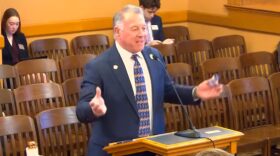Micah Holmes with the Oklahoma Department of Wildlife Conservation said the department wanted to provide clarification in light of two recent court decisions involving jurisdiction in Indian Country: Stroble v. Oklahoma Tax Commission and Stitt v. Tulsa.
He said tribal citizens need state-issued hunting and fishing licenses if they plan to hunt or fish outside of trust land. Without one, he noted, that's a misdemeanor or a state-issued citation.
"Those two recent court cases indicate that citations that would be issued as a result of not having a hunting and fishing license, for example, would be something that would stand up in state court," Holmes said. "So that's why we are, you know, just making that affirmation that we are going to make sure that all Oklahomans have hunting and fishing licenses."
The cases at the heart of ODWC's reasoning
One case, Stitt v. City of Tulsa, involves Cherokee Nation citizen Keith Stitt (brother of Gov. Kevin Stitt) challenging the city's jurisdiction to issue a traffic citation he received within Muscogee Nation boundaries. Stitt lost that case in March, and this week the U.S. Supreme Court declined to hear an appeal.
The Stroble case questioned whether Muscogee Nation citizen, employee and resident Alicia Stroble was exempt from state income tax. Ultimately, the court determined that only tribe-owned trust land meets the legal definition of "Indian Country," not entire reservations.
Holmes said the Stroble decision is more relevant to the ODWC's enforcement practices than McGirt v. Oklahoma, which determined tribes have jurisdiction over major crimes committed on their reservations by members of a federally recognized tribe.
"We've been following this case law closely," Holmes said. "We think that the Tax Commission has a direct effect on what we do — hunting and fishing. Because if you don't have a hunting fishing license, that's a misdemeanor. It's not a major crime."
Stephen Greetham, an attorney at Greetham Law, PLLC, who represents Tribal nations, said the Stroble case did not raise any questions about criminal jurisdiction, though.

"There is a broad sweep of federal law that affirms they don't have the jurisdiction they're [ODWC] claiming," Greetham said. "That federal law includes the Oklahoma Enabling Act, which, as a condition of Oklahoma even becoming a state, had to accept that it had no authority whatsoever to interfere with tribal rights or the federal authority with respect to tribes. That's a condition of statehood."
Robert Gifford, a Cherokee Nation Citizen and tribal court judge for two major tribes, said, ultimately, hunting and fishing rights are essentially treaty rights, and the Oklahoma Supreme Court does not have the authority to overrule a treaty.
"It kind of goes back to the McGirt thing where they said, 'Hey, if Congress enters into a treaty, only Congress can do away with it. No one else,'" Gifford said. "You can't write laws around it. …So the state of Oklahoma, you know, the Oklahoma Supreme Court, within its authority, does not supersede and take precedent over an act of Congress or a federal treaty between a tribe and the United States government."
Gifford said he believes this issue will further lead to litigation, as trust land often hosts important tribal property, such as casinos, tribal housing or government buildings.
Experts blame expired compacts for legal gray area
Some leaders of the five largest tribes in Oklahoma similarly vocalized that the court cases are not relevant to the issue at hand, noting they are following federal law.

"Our Cherokee Nation Hunting and Fishing model that we created is fully in line with federal law and the sovereign treaty rights with the United States," Cherokee Nation Principal Chief Chuck Hoskin Jr. said in a statement. "It is dangerous and misleading for the state of Oklahoma to twist unrelated legal rulings to claim otherwise."
Hoskin Jr. pointed the blame at Gov. Kevin Stitt for refusing to renew hunting and fishing compacts with his nation and the Choctaw Nation in 2021, as did Muscogee Nation Principal Chief David Hill.
Following the compacts' expiration, the five tribes signed a reciprocity agreement last summer, allowing tribal members of the Cherokee, Chickasaw, Choctaw, Seminole and Muscogee Nations to hunt and fish within their respective reservations using tribally-issued licenses. In many cases, tribal membership can act as a license.
Holmes acknowledged that the end of those compacts left some gaps at the ODWC.
"They provided some funding for the wildlife department, and they provided some clarity for those folks who, you know: 'Do I need a license or not?'" Holmes said. "Without those compacts, what was lost was, was some funding for the Wildlife Department and some clarity for those folks."
Efforts to protect tribal hunting and fishing rights since time immemorial continue
William Norman, a lawyer at Hobbs Straus Dean & Walker and a Muscogee Nation citizen, also took fault with Gov. Stitt and the state's legal interpretation of hunting and fishing rights on Indian reservations, calling it "inflammatory" and "nonsensical."
"Stitt recently vetoed S.B. 208, stating, 'I refuse to sign legislation that creates more unnecessary [hunting] licenses for Oklahomans,'" Norman said in a statement. "Yet when it comes to tribal citizens, he is more than happy to threaten punishment for the exercise of sovereign hunting and fishing rights. Native people were here hunting and fishing on their ancestral and treaty lands long before Oklahoma was a state."
Although the ODWC's statement is in line with Stitt's stances on tribal jurisdiction, there's no indication Stitt had any role in ODWC's decision to issue a statement.
"I'm not aware it was the request of anybody," Holmes said.
Stitt's office did not immediately respond to a request for comment.

Choctaw Nation Chief Gary Batton said his sovereign nation will continue safeguarding the rights his people have always exercised.
"The Choctaw Nation will defend the rights of our tribal members and our Nation against intimidation and harassment in violation of tribal and federal law," Batton said. "Any tribal member who receives a citation or has personal items confiscated by an Oklahoma game warden while fishing or hunting within the boundaries of one of the Five Tribes' reservations should contact the Choctaw Nation Tribal Public Defender's Office."
Hill also directed Muscogee citizens to contact the tribe's Department of Interior Affairs if they receive a citation for not having a state license within their reservation.
Copyright 2025 KOSU







